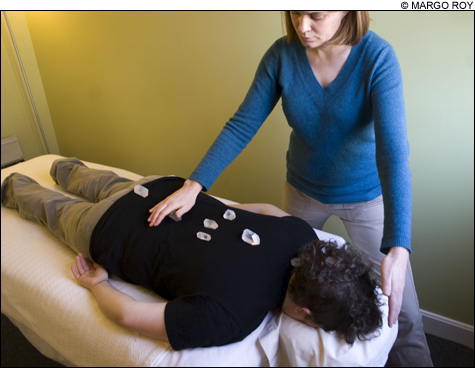While she accepts insurance as a licensed massage therapist, the majority of Hayes's clients pay out-of-pocket. "I love accepting insurance," she says. "I know I'm going to get paid, I know I'm going to get paid what I feel I'm actually worth, and it enables me to have a sliding scale (for other clients)." Hayes has accepted as little as $40 in sliding-scale fees for her sessions, an amount some local industry professionals argue is too low. "I believe everybody should have access to experiences that help them walk into their bodies," Hayes says. "And I'm not waiting for Western health care to give that to them."
Healy agrees. "It's really important to me that this type of work is affordable. The financial piece is a huge reason why people don't come. I don't even have $100 to get healing work for myself. I mean, who has it?"
Ethically committed though they are, Hayes and Healy refuse to give out their services for free. Instead, they encourage underfunded clients to work with the Portland Hour Exchange, a local non-profit organization that supplies registered clients goods and services through a network of non-monetary trade options.
"You could join Hour Exchange and get tons of free alternative health care," Healy says. "That's a huge resource that I don't think anybody really knows about in our community."
Founded in 1996, the Portland Hour Exchange now has over 200 alternative health practitioners in its network, and over a third of its transactions are health-care related.
"Certainly there's been an increase in need," says Hour Exchange executive director Lesley Jones, who says most people in Portland are either uninsured or have inadequate insurance. "Some people have figured out that by tapping into the Hour Exchange, they can gain access to these services where they otherwise wouldn't be able to."
Jones also points to Turn the Tide, a network comprised of a small group of established alt-health professionals (such as naturopaths, acupuncturists, and chiropractors) that offer services on a less mediated "pay-it-forward" model, as another public resource. Established in 2009 as a direct response to the recession, Turn the Tide depends on volunteer-based services from professionals that can afford to give their time away. While this is another example of the ethical strain that guides the industry, it's a gesture that can only go so far.

POLARITY WORK Cailin O’Connor works on a patient using hands-on techniques and crystals. |
THE CASH FACTOR
While these models have helped to stabilize and promote individual practices, many practitioners believe they only scratch the surface of a core accessibility issue, the prohibitive cost.
"Something the industry has always struggled with, and I think it's getting better, is that a lot of people see massage as a luxury item," says Steven Thomas, "that you only do as something extravagant, or for a birthday or anniversary or something." In Maine, he sees that concept changing as the health care narrative unfolds. "More and more of my clients see it as a part of their daily or monthly or weekly health care," he says.